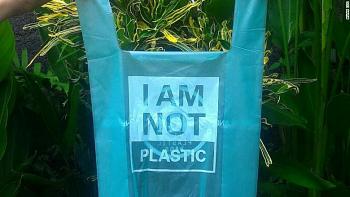Bags Made Out Of Plants Could Solve Plastic Pollution Suggests Indonesian Company
The island of Bali is a jewel of the Indonesian archipelago which face plastic pollution.
Only China dumps more plastic in the ocean than Indonesia, and much of it washes up in Bali documents CNN.
The crisis inspired local surfer and entrepreneur Kevin Kumala to find a novel solution.
"I was with a friend sitting outside a bar and we were seeing hundreds of motorcyclists wearing vinyl ponchos," he recalls. "It clicked that these disgusting, toxic ponchos would be used a few times and then discarded, but they would not decompose."
The biology graduate was determined to create a "better plastic", that would leave no trace.
Salvation came in the form of cassava, a cheap and common root vegetable across Indonesia.
"Kumala and his school friend partner studied the emerging field of bioplastics, and took inspiration from new materials based on corn and soy starch. They devised their own recipe using cassava starch, vegetable oil, and organic resins", elaborates the CNN report.
The resulting "100% bio-based" material was biodegradable and compostable, breaking down over a period of months on land or at sea, or instantly in hot water. Kumala claims the bioplastic leaves no trace of toxic residue, a point he demonstrates by dissolving and drinking it.
"I wanted to show this bioplastic would be so harmless to sea animals that a human could drink it," he says. "I wasn't nervous because it passed an oral toxicity test."
The entrepreneur launched a company in 2014 selling cassava-plastic ponchos. Today, Avani Eco produces four tons of material a day that is used for products including plastic bags, food packaging, and covers for hospital beds.
Avani's factory has the capacity to produce five times as much plastic, and the founders hope to push it to the limit.
Comments
There are 0 comments on this post













